
Fottea
Scope & Guideline
Fostering collaboration in the vibrant realm of plant sciences.
Introduction
Aims and Scopes
- Taxonomy of Microalgae:
Fottea emphasizes the detailed taxonomic classification of various microalgae, particularly diatoms and cyanobacteria, contributing to the understanding of biodiversity in aquatic ecosystems. - Phylogenetic Studies:
The journal publishes research that employs molecular phylogenetics along with morphological analyses to elucidate the evolutionary relationships among microalgal species. - Ecological Characterization:
Research articles often focus on the ecological roles and environmental adaptations of microalgae, providing insights into their distribution patterns and ecological significance. - New Species Descriptions:
Fottea frequently features the description of new species, highlighting the ongoing discoveries within microalgal diversity and their potential implications for taxonomy. - Diversity Assessment:
The journal aims to assess the diversity and distribution of microalgae in various habitats, contributing to the understanding of ecosystem health and biodiversity.
Trending and Emerging
- Molecular Systematics and Phylogenetics:
There is a growing trend towards using molecular techniques for the systematics of microalgae, which enhances the resolution of taxonomic classifications and phylogenetic relationships. - Ecological and Environmental Impact Studies:
Research focusing on the ecological roles of microalgae in various environments, including their responses to environmental stressors, is increasingly prominent, highlighting their importance in ecosystem management. - Novel Species and Genus Descriptions:
The journal has seen a rise in the description of new species and genera, particularly from underexplored regions, indicating a robust interest in expanding the taxonomic inventory of microalgae. - Integration of Ecological and Taxonomic Research:
Emerging studies are increasingly integrating ecological assessments with taxonomic research, reflecting a holistic approach to understanding microalgae within their ecosystems. - Research on Cryptic Species:
An increase in studies addressing cryptic species within well-known taxa signifies a deeper exploration of biodiversity, which may have implications for conservation and ecological studies.
Declining or Waning
- General Reviews of Species:
There has been a noticeable decrease in comprehensive reviews of existing species, particularly those that do not introduce new classifications or insights into diversity. - Traditional Morphological Studies:
Research focused solely on traditional morphological descriptions without molecular support appears to be waning, as the field increasingly values integrated approaches combining morphology and molecular data. - Studies on Well-Documented Species:
The publication of studies on species that are already well-documented seems to be declining, as researchers are now prioritizing novel species and underexplored taxa.
Similar Journals

ALGAE
Innovating research for a healthier planet.ALGAE, an esteemed publication by the Korean Society of Phycology, serves as an authoritative platform for researchers and practitioners in aquatic science, ecology, and plant science. Founded in South Korea, this journal has established a commendable reputation, reflected in its Q1 rankings across multiple categories in the 2023 Journal Citation Reports and its impressive Scopus rankings, which position it in the top 20% of its fields. With a scope that encompasses the latest advancements in algal studies, highlighting both fundamental and applied research, ALGAE is crucial for those looking to deepen their understanding of phycology and its implications for biodiversity and ecosystem health. Though not an open-access journal, it provides valuable insights and cutting-edge findings that are vital for the scientific community engaged in ecological and biological research. With its robust trajectory from 2013 to 2024, ALGAE continues to push the boundaries of knowledge and foster innovation within the discipline.

European Journal of Taxonomy
Pioneering research in taxonomy and systematics.The European Journal of Taxonomy is a distinguished open access journal, published by the MUSEUM NATL HISTOIRE NATURELLE in France, dedicated to the rich and dynamic field of taxonomy, ecology, and systematics. Since its inception in 2011, this journal has aimed to provide a platform for the dissemination of high-quality research and innovative methods relevant to the study of biodiversity and species classification. With a commendable Q2 ranking in the Ecology, Evolution, Behavior and Systematics category as of 2023, the journal ranks 380 out of 721 in Scopus, highlighting its pivotal role in advancing scientific knowledge in these essential areas. Researchers and students alike will find valuable resources and contributions that address pressing ecological and evolutionary questions from 2015 to 2024. By promoting open access, the European Journal of Taxonomy ensures that vital research is accessible to a broader audience, fostering collaboration and discourse among professionals striving to enhance our understanding of the natural world.
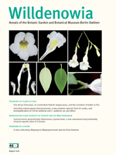
Willdenowia
Advancing botanical knowledge, one article at a time.Willdenowia is a prestigious scientific journal published by the Botanischer Garten & Botanische Museum Berlin-Dahlem, dedicated to advancing the field of botany and plant sciences. With an ISSN of 0511-9618, this journal has established itself as a crucial platform for researchers, practitioners, and students interested in ecology, evolution, behavior, systematics, and plant science. The journal boasts an impactful reputation, evidenced by its impressive Q1 and Q2 quartile rankings in Plant Science and Ecology, Evolution, Behavior and Systematics respectively, as well as notable Scopus rankings, placing it within the top quartiles of its categories. Although access is not open, articles published in Willdenowia contribute significantly to the global body of botanical research, making it an essential resource for anyone looking to deepen their understanding of plant biology and related ecological disciplines. The journal has continuously evolved since its inception and aims to facilitate interdisciplinary collaboration and knowledge dissemination in the life sciences.
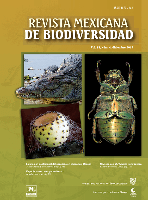
Revista Mexicana de Biodiversidad
Illuminating the Path to Biodiversity PreservationRevista Mexicana de Biodiversidad is a prominent academic journal dedicated to the field of biodiversity and conservation, published by the prestigious Instituto de Biología, Universidad Nacional Autónoma de México. Since its inception as an Open Access publication in 2005, it has aimed to disseminate high-quality research that advances the understanding of biological diversity in Mexico and beyond. With an ISSN of 1870-3453 and an E-ISSN of 2007-8706, the journal caters to a diverse audience, including researchers, professionals, and students, by providing vital insights into ecological studies, conservation strategies, and the sustainable management of natural resources. The journal is committed to fostering scientific collaboration and promoting the significance of biodiversity in addressing contemporary environmental challenges. By publishing innovative and impactful research, the Revista Mexicana de Biodiversidad plays an essential role in the global discourse on biodiversity conservation.
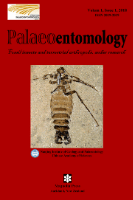
Palaeoentomology
Fossils Tell Stories: Discovering the World of Ancient InsectsPalaeoentomology is a leading journal dedicated to the study of fossil insects, fostering a deeper understanding of historical biodiversity and ecosystem dynamics. Published by MAGNOLIA PRESS, this journal provides an essential platform for researchers, educators, and students interested in entomological paleontology and related disciplines. Featuring a wide range of articles that explore fossil records, evolutionary patterns, and paleoenvironments, it serves the scientific community by enriching our understanding of the past. Although currently not open access, the journal prioritizes rigorous peer-review standards and aims to maintain a high impact factor, ensuring that published research meets the evolving demands of the field. Based in Auckland, New Zealand, it welcomes contributions from both established and emerging scientists worldwide, contributing to a vibrant discourse in the study of ancient insects and their ecological relationships.
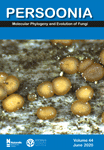
PERSOONIA
Championing Excellence in Plant Science ResearchPERSOONIA, a distinguished journal published by RIJKSHERBARIUM, serves as a pivotal platform for the dissemination of high-quality research in the fields of Ecology, Evolution, Behavior, and Systematics, as well as Plant Science. Established with a commitment to advancing scientific knowledge, PERSOONIA has achieved an impressive Q1 ranking in these areas, highlighting its significant impact within the academic community, as evidenced by its ranking of #12 out of 721 journals in its field, placing it in the top 2% of publications. With a publication history that spans from 1996 to present, the journal regularly features innovative studies that push the boundaries of understanding in ecological and botanical sciences. While Open Access options are currently limited, researchers and professionals alike benefit from subscription access to this vital resource. Located in the Netherlands, PERSOONIA continues to be a beacon for scholars aiming to enrich the discourse in evolving ecological and plant science disciplines.
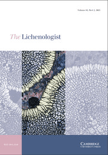
LICHENOLOGIST
Exploring the Intersection of Ecology and LichenologyLICHENOLOGIST is a prestigious journal published by Cambridge University Press, dedicated to advancing the field of lichenology and promoting a deeper understanding of the ecology, evolution, and systematics of lichens. Established in 1958 and focusing on the convergence of research through 2024, this journal has established itself as a significant resource within the Q2 category of Ecology, Evolution, Behavior and Systematics. With a Scopus ranking of #316 out of 721 in its field, it highlights research that not only enhances academic knowledge but also has practical implications for ecology and conservation efforts globally. Although traditionally not an open-access journal, it provides valuable insights and contributes to the scientific community by disseminating high-quality, peer-reviewed research. LICHENOLOGIST is essential for researchers, professionals, and students looking to stay informed about the latest advancements in lichen studies, making it an indispensable resource for anyone involved in ecological and biological sciences.
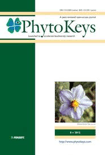
PhytoKeys
Connecting scholars to cutting-edge plant research.PhytoKeys is a prominent open-access journal published by PENSOFT PUBLISHERS that has become a vital resource in the fields of Agricultural and Biological Sciences, Ecology, Evolution, Behavior and Systematics, and Plant Science. Since its inception in 2010, PhytoKeys has provided a platform for researchers and scholars to disseminate high-quality botanical research, making it increasingly relevant globally. The journal enjoys a commendable impact factor reflected in its 2023 ranking, positioning it in the Q2 quartile across multiple categories, including the 61st percentile in Agricultural and Biological Sciences (miscellaneous) and the 53rd percentile in Plant Science. With a dedicated editorial board and a mission to advance our understanding of plant diversity, taxonomy, and conservation, PhytoKeys supports the academic community by facilitating accessibility to cutting-edge research. Its commitment to open access ensures that valuable knowledge is readily available to researchers, professionals, and students worldwide, fostering collaboration and innovation in plant sciences.
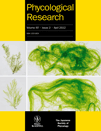
PHYCOLOGICAL RESEARCH
Exploring the vital role of algae in our world.PHYCOLOGICAL RESEARCH is a leading journal in the field of aquatic and plant sciences, published by Wiley, recognized for its commitment to advancing knowledge in the study of algae and their ecological significance. With a diverse scope encompassing ecological interactions, evolutionary behaviors, and physiological processes, PHYCOLOGICAL RESEARCH aims to provide a platform for researchers to disseminate innovative findings and insights pertinent to both agricultural and biological sciences. The journal's impressive rankings—placing it in the 74th percentile within Agricultural and Biological Sciences (miscellaneous) and holding a Q2 category in key fields—underscore its impact and importance in academia. Despite not being open access, the journal ensures broad distribution and visibility through its dedicated readership. Since its inception in 1995, PHYCOLOGICAL RESEARCH has continuously evolved, shaping and influencing the direction of research in phycology and related disciplines, making it an essential resource for students, professionals, and researchers alike.

BRITTONIA
Illuminating Plant Biology for a Greener TomorrowBRITTONIA, published by Springer, stands as a reputable journal dedicated to advancing the fields of botany and plant sciences. With a storied history dating back to 1931, this journal has evolved to embrace contemporary research spanning various aspects of plant biology, ecology, and systematics. Focusing on a comprehensive analysis of both ecological interactions and plant systematics, BRITTONIA plays a crucial role in disseminating knowledge among researchers and professionals committed to understanding plant life and its environmental contexts. Despite its open access status being currently unavailable, the journal ensures wide accessibility through institutional subscriptions. In the latest rankings, it proudly holds a Q2 category in Plant Science and a Q3 category in Ecology, Evolution, Behavior, and Systematics, indicating its growing influence and academic rigor. Researchers and students alike will find BRITTONIA an essential resource for the latest findings and discussions in plant sciences.